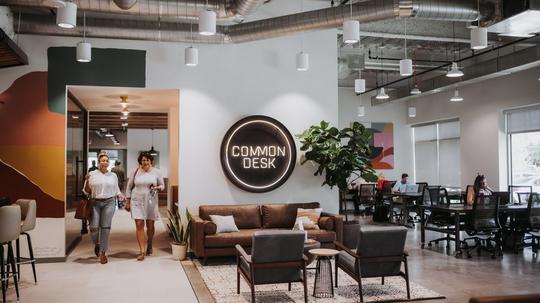
When it comes to the recently declared pandemic of COVID-19, commonly called the coronavirus, health experts recommend social distancing, among other things. However, that piece of advice conflicts with the idea behind coworking spaces.
As the virus spreads across the region, with Gov. Greg Abbot declaring a state of disaster in Texas, coworking spaces are looking at how to change their daily functioning and prepare for a potentially prolonged slowdown of business.
“Member safety and staff safety is first and foremost,” said Nick Clark, CEO and founder of Dallas-based Common Desk. “Any of the changes we’re making… will focus on that before anything else.”
Nearly every coworking company that NTX Inno spoke with has stepped up sanitation efforts in their spaces, having staff or cleaning service providers more heavily and frequently sanitize surfaces. In addition, all were cancelling large community events in their spaces.
In addition, a number of coworking spaces are allowing their staff to work remotely, if they choose. Some companies, like WeWork, have restricted non-essential business travel for their members and employees.
“It is critical that we protect ourselves and our community,” WeWork wrote in a newsletter to members on Thursday.
Friday, Capital Factory announced it will be operating under “Readiness Level 4” in response to the coronavirus, meaning that while coworking spaces remain open, in-person events are canceled, member guests are limited and members who fail to follow self-quarantine guidelines will have their membership terminated.
So far, NTX Inno has not become aware of any coworking spaces that have completely closed their offices.
“We’ll just keep monitoring, and right now, thank goodness there’s been no cases reported in the Common Desk community and so no need to fret on that front,” Clark said.
But how to deal with the problem of social distancing, when coworking inherently involves interaction? Local coworking spaces, like Common Desk and WorkSuites are offering virtual office services to members. Clark said Common Desk is even hosting digital happy hours. In addition, both companies said they are allowing members to use private office spaces that have not been rented out.
Common Desk has even gone as far as to remove chairs from its common spaces, so that members can be further spread apart from each other, even when not separated by the walls of a private office. The company is also sending members who have been told to stay home by their companies back to their houses with coronavirus kits, including mugs and coffee beans, so they make their kitchen tables still feel like their office.
However, despite efforts to keep members and staff safe and connected, nearly every coworking company that NTX Inno spoke to said they have seen a decline in member applications and in general foot traffic in their spaces. Some, like Common Desk are offering virtual tours to prospective new members. Though, while applications may have slowed down, WorkSuites CEO Howard Flip and Clark said many potential members have expressed interest in continuing the application process after the virus dissipates. He added that only two members out of thousands have canceled their membership.
For WorkSuites, Howard says he isn’t too concerned about the impact the virus is having. He said that because the company is more focused on private office clients with longer contracts it may be more insulated than some other coworking companies. He added that WorkSuites operates debt free.
“I feel bad for, say a restaurant. Nobody comes in, they don’t get any money,” Howard said.
Howard also said that in the long term, the virus could have a potential benefit to coworking companies. WorkSuites has been around since 2001 and Howard has seen the company through rough times like the terror attacks on Sept. 11 and the recession of 2008. He said that he has noticed that after times of uncertainty, some people look for more flexibility from their workspace and companies like his are well positioned for that.
“I see a lot of people snapping back and I think we’ll have a rush of people signing up for office space,” Howard said. “I think we’ll see an uptick in business when this passes.”
While Clark said he is not yet very concerned about the future impact of the virus, he said companies like Common Desk face a more immediate threat due to many members being on monthly subscriptions to the space. However, he said being a relatively smaller business in the industry helps, in that the company is a bit more mobile than national giants like WeWork.
“Our mission is to enhance the workday for everyone, so how can we continue doing what our mission statement says we do in these times of uncertainty?” Clark said. “Small business right now is kind of in trouble. It’s kind of a call to action to take responsibility and support local business right now. We’re one of those small businesses, where we depend on all our members to keep us going, so I think we’re all hoping there’s a little power of loyalty.”








